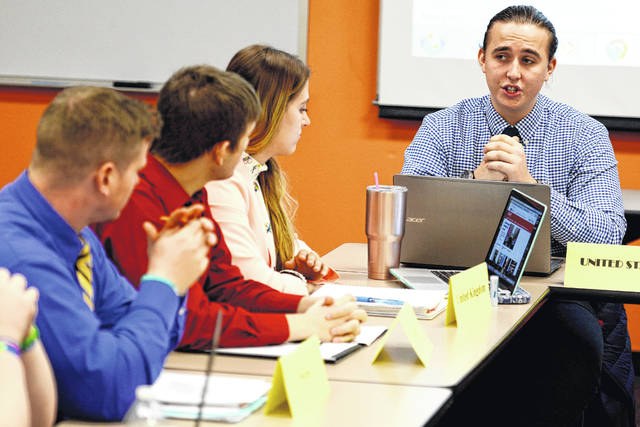
WILMINGTON — The Iran nuclear deal was a controversial agreement when approved by the Obama Administration and other major entities on the world stage. It was no less contentious when Wilmington College students assumed the roles of interested nations for a grand debate on its merits.
The class forum of a global summit essentially pitted the United States and Israel against Iran, China, Russia, the United Kingdom, European Union and a host of Arab states in debating the Joint Comprehensive Plan of Action (JCPOA), which ended longstanding economic sanctions against Iran in exchange for limitations on its nuclear program.
Earlier this year, the Trump Administration pulled American support for JCPOA, which has further alienated such traditional U.S. allies as Germany, France and the U.K.
Dr. Michael Snarr, professor of political science, has been staging these summits in his Global Politics classes for some 20 years as a means for highlighting “current, critical issues” in the world. He believes it’s an especially effective hands-on learning exercise.
“The global summit, over four class periods, works so well for getting things across,” Snarr said. “Students have to learn the material, but it’s not like for a test, which is over in an hour and is only between them and me. With the summit, their peers also see them and they depend on each other — as coalitions and alliances are dependent upon multiple partners.”
As Snarr considered which students would represent 16 countries and coalitions, he knew the United States would, as always, play a pivotal role in the proceedings. He selected as the American delegate Eric Lundquist, a sophomore from Sweden majoring in political science with a minor in economics.
“It was a big role to be responsible for, especially since it would be difficult to cooperate with some of the other countries at the summit,” Lundquist said, adding he prefers to be tested through this type of collegial interaction that demands quick thinking over more traditional written exams.
“It requires you to do more research and study more to succeed,” he added. “During the summit, we didn’t only have to know the stuff for our own country, but also for the other countries.”
Lundquist scored some major points when — in a debate with the delegate from the United Kingdom, who chastised the Trump Administration for turning its back on the nuclear deal that Pres. Obama supported — his retort was pointing out Great Britain’s exit from the European Union.
“When Eric brought up Brexit, that was a highlight of my 20 years of doing this,” Snarr said, adding that those students who “read, digested and integrated into the summit” related events that occurred within hours of the summit scored bonus points.
One such instance was inserting into the dialogue the visit to England the previous weekend by Israeli Prime Minister Benjamin Netanyahu, which served to illustrate a point about Israel’s relationship with the U.S. and its European allies.
“Students need to keep up on current developments to prevent from being blindsided at the summit,” he said, adding that he’ll sometimes “stir the pot” by sending articles to certain students representing key nations.
Another student who found the summit both enjoyable and challenging was Savannah Hooper, a senior majoring in biology with a minor in chemistry, who took Snarr’s course as a means for gaining knowledge about an area diametrically different from her normal pursuits in the sciences.
“This summit made me think and interact on a whole new level,” she said. “It pushed me outside my comfort zone by not only having to prepare, but also having to respond and defend my point.”
Hooper noted that, in her role as the delegate from Israel, she felt somewhat “isolated” when Arab states confronted her country. “The U.S. support for Israel was huge in the summit. If I were solo, it would have been very difficult. Eric (the U.S.) was very convincing and demanding — he did a fabulous job.”
Lundquist added that another interesting component of the experience for him and other students, was representing a country “that believes or conducts policies” with which one might not fully agree. “That is why the summit also provided a good look at the other side of an argument.”
Snarr said the global summit resulted in several resolutions passed over the U.S. and Israel’s objections, but that raises the question of how valid or constructive are those or any resolutions without the most powerful country in the world backing them?
“That’s exactly where we are now,” he said, noting students undoubtedly have a better sense of the divisions within the United States and how the world’s geopolitical landscape is currently aligned.
“This year’s was one of the best summits. Top to bottom, this was as good as any class I’ve had.”


